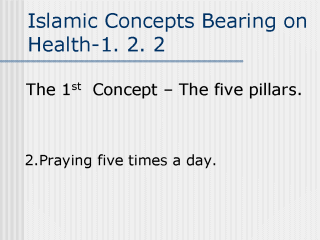| front |1 |2 |3 |4 |5 |6 |7 |8 |9 |10 |11 |12 |13 |14 |15 |16 |17 |18 |19 |20 |21 |22 |23 |24 |25 |26 |review |
 |
The second
pillar, “performing the five prayers at their correct time”, (Quran 2:238; 7:170;
20:14) is one of the actions within Islam which build up a Muslim to a practice of
discipline. The prayers are set at intervals starting from before sunrise and ending up
well after sunset (Quran 4:103). In performing the prayers Muslims follow a set of
activities outlined in the Quran and explained in the ahadith. This pillar offers several
links towards the Islamic health continuum. From the indirect stage, its psychodynamics of
ritual, in the performance of the prayers, offers routine meditation, which results in a
sense of relaxation, hopefulness, contentment and positive emotions that could be said are
the building blocks of the ‘Sense of Coherence’ coined by Antonovsky (1979, 1987). A
more direct link towards health is seen in the habitual steps that a Muslim has to do
prior to performing the prayers. One of the steps is performing the ablution, which
involves the washing of ones face, washing hands to the elbows, rubbing the head with
water and washing the feet up to the ankles respectively (Quran 5:6, Sahih Bukhari Volume
1 Book 4, No 137-140). In this act Muslims are duty-bound to clean themselves at least
five times in a day, clearly a sign of the importance of hygiene within Islam. Reference: Antonovsky, A. (1987). Unraveling the mystery of health: How people manage stress and stay well. 1st ed. San fransisco. Jossey-Bass Publishers Antonovsky, A. (1979). Health , Coping and Stress. 1st ed. 433 California street, San Fransisco, Califronia 94104. Jossey-Bass Inc. Khan M. M.(2001). Sahih Bukhari Translation. Muslim Student Association, University of Southern California. Web site |
| front |1 |2 |3 |4 |5 |6 |7 |8 |9 |10 |11 |12 |13 |14 |15 |16 |17 |18 |19 |20 |21 |22 |23 |24 |25 |26 |review |